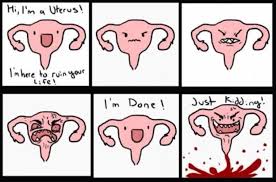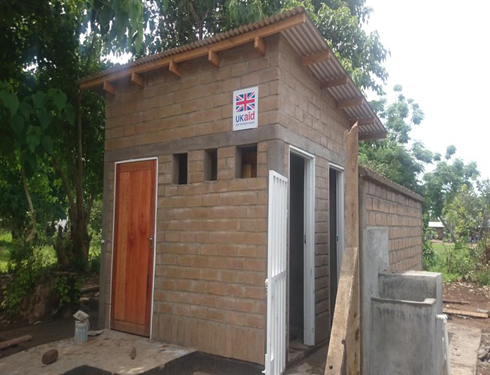I vividly remember when I started my periods and the time leading up to it; I had little information about my body as you can imagine a young 12 year old primary school girl. But I remember learning about it in class with a classroom half full of boys and all the male teacher said was when girls get to a certain stage they start bleeding and they bleed every month. This lesson was a nightmare for the girls in that class as you can imagine and fun for the boys. What followed were weeks on end of boys teasing and making fun of us about periods, about when we were going to start, how they will know each month when we are on our periods, and how we cannot hide it because our hands get soft and all that. I was shocked at how much they knew about my body and ashamed at the same time of myself, for knowing so little about my own body. So when I finally started my periods my mum, like many mothers in my society, invited one of her older friends to come ‘talk to me’ and this old lady delivered the same message which am sure most Malawian girls are familiar with. She said: “Don’t play with boys” “Now you are a woman, you will get pregnant” “Hide it from your father” “Don’t cook this, don’t touch that” and the worst, scary thing this woman did was to lie to me that my father should never see my period blood or else he will go blind. Imagine being 12 years old and being burdened with this task of having the ability to make your own father blind simply from a normal body function you have no control over. This stranger all of a sudden taught me how to behave in my own house and with my own father. There was so much emphasis on how my relationship with my father had to change as I was “different” now. All this information could not be digested by my little 12 year old immature brain. But I adjusted. I changed.

I remembered all this as I was doing a research for a topic on period shaming for a weekly twitter conversation I host. I had never heard the term before and during my research I stumbled upon The Period Poem, this poem was written by Dominique Christina a performance artist and activist who has a 13-year-old daughter. The poem is a response to tweets shaming menstruation which was sent by a young boy stating that he dumped his girlfriend because she had started her period while they were having sex. Dominique’s daughter sent her a text of the tweets. The poem is also dedicated to her daughter whom she threw a period party for when she started menstruating and all invited guests wore red, the house was decorated in red, and all the food and drinks were red. All red everything!
The poem is powerful, intense and profound, and speaks even louder on issues that have been present from way back in history of how women are shamed, embarrassed and made to feel awkward about a natural body function they have no control over, something as natural as breathing. A monthly reminder of the power a women’s body has to recreate and give life and yet still in the 21st century period shaming exists. Period shaming does not only exist in my society or the most rural villages in Africa it cuts across borders, religion, race and color. The taboo of menstruation in India causes real harm. Women in some tribes are forced to live in a cowshed throughout their periods and there are health issues connected to this, like infections caused by using dirty rags. There is a story of one girl who was too embarrassed to ask her mother for a clean cloth, and used one she found without knowing it had lizard eggs in it, the subsequent infection meant her uterus had to be removed when she was 13.
Lately there have been talks in the girls’ education discourse of the impact menstruation has on girls absenteeism at school and consequently dropping out. There is no doubt that menstruation is associated with numerous physical, socio-cultural, and economic challenges for school age girls and young women in the developing world. Among them are the physical discomforts and inconveniences of menstruation, ranging from cramps to headaches, lack of access to adequate sanitary materials and toilets on school grounds, and limited information of menstruation, which can lead to shame. Poverty plays an important role as well, as most girls cannot afford to buy sanitary pads. A couple of weeks ago UNICEF with funding from DFID under one of their WASH projects in Salima officially opened the new toilets they built at Yambe and Mkwero community day secondary schools, the project aims to improve sanitation at schools by constructing 3 toilets per school: one for girls, one for boys and the other one for staff members. The cost of one toilet is approximately MK15 million ($34,000).


But in constructing girls’ only toilets in public schools are we not as programmers perpetuating period shaming, if it is a natural body function for girls and the boys at school know this too well from their Biology class, why then do we feel the need to exclude girls and make them have their own toilet? If it is a normal body function they have no control over WHY the need to hide them and add on to the shame and guilt that society is already subjecting them to. The Population Council conducted a survey in Malawi to find out the connection between girls’ absenteeism and menstruation; the findings showed that nearly one-third of female students reported missing at least one day of school during their previous menstrual period. However, the data indicate that menstruation accounts for only a small proportion of all female absenteeism. The lack of a gender gap in overall absenteeism underscores this finding. The study’s authors interpret the results of their research as suggesting that absenteeism due to menstruation does not stem primarily from school environment (e.g., cleanliness and privacy of toilets). Findings clearly show, however, that factors associated with girls’ home environments can be significantly associated with lower likelihood of absence during the last menstrual period. These include co-residence with older women (especially a grandmother) and the amount of time girls are able to study at home, which is partly related to parental support and encouragement. Based on these observations, the authors conclude that adolescent girls’ school attendance is unlikely to increase substantially through the improvement of toilet facilities or provision of sanitary supplies.
Tackling the issue of period shaming should begin at home. It is after all a family issue: that is where culture and tradition are deeply rooted and manifest. It is about fathers, brothers, uncles and all men in the house being part of the period talk with the girl child; and not leaving it as another task for the mother and women in the house. As a little girl I would have loved for my father to have been part of my period talk, in shunning away he was the first person that subjected me to period shaming and made me feel dirty for being a woman. I know it is a far fetched dream but imagine boys and young men being part of this and growing up in a culture where they are taught to appreciate and respect women’s bodies. At an early age this would have such a great impact on how they grow up as husbands and fathers and maybe we would not even struggle with male involvement in women’s reproductive health issues after all.
Sources: http://www.nytimes.com/2012/12/29/opinion/the-taboo-of-menstruation.html?_r=2&
